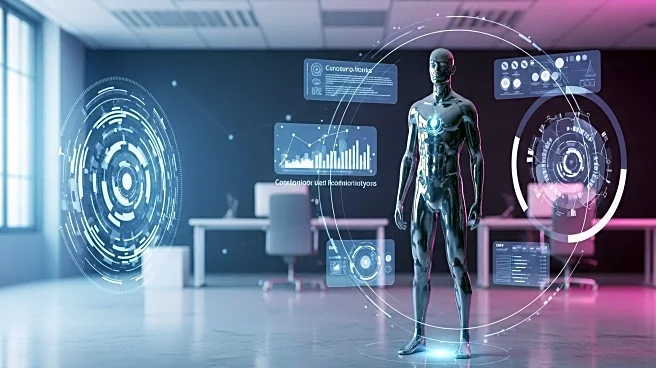What's Happening?
Chinese technology companies are increasingly investing in digital employees powered by artificial intelligence (AI) agents to enhance productivity and drive digital transformation. These AI agents, which are more advanced than traditional chatbots, are capable of autonomously performing complex tasks across various industries. Companies like Baidu have already launched AI-powered digital employees in roles such as marketing managers, car salespersons, and product managers. The market for AI agent marketing and sales in China was valued at 44.2 billion yuan ($6.2 billion) in 2024 and is projected to exceed 1 trillion yuan in the next five years. Industry experts suggest that AI agents will become integral to enterprise operations, participating in all aspects of business functions.
Why It's Important?
The integration of AI agents into the workforce represents a significant shift in how businesses operate, potentially leading to increased efficiency and productivity. As AI agents take on more roles traditionally held by humans, there is a potential for job displacement in repetitive and mechanical positions. However, this shift also opens up opportunities for new types of employment focused on creative and strategic tasks. The widespread adoption of AI agents could lead to a redefinition of workforce organization, with digital employees becoming a core component of business operations. This transformation could have far-reaching implications for industries such as education, finance, and consumer goods, as well as for the global economy.
What's Next?
As AI agents continue to evolve, businesses will need to adapt to this new workforce dynamic by integrating AI into their operations and training employees to work alongside these digital counterparts. Companies may need to invest in upskilling their workforce to focus on creative and strategic roles that AI cannot easily replicate. Additionally, there may be regulatory and ethical considerations as AI agents become more prevalent in the workplace. Organizations will need to address concerns related to data privacy, security, and the potential for bias in AI decision-making processes.
Beyond the Headlines
The rise of AI agents as digital employees could lead to a broader societal shift towards an AI-driven economy. This transformation may challenge existing labor laws and necessitate new policies to protect workers' rights in an increasingly automated world. Furthermore, the cultural implications of AI agents replacing human roles could lead to changes in how work is perceived and valued. As AI agents become more capable, there may be a need for ongoing dialogue about the ethical use of AI in the workplace and its impact on human employment.










